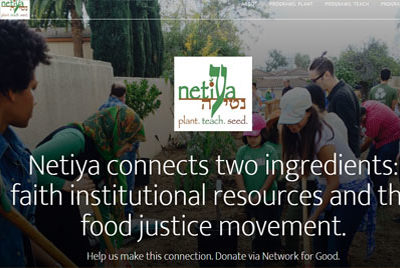Netiya
LA’s Troubling Distinction: From 1909 to 1949, Los Angeles County produced more food than any other county in the nation. Now, LA leads the nation in having more food-insecure people than any other county in the US – nearly 1.5 million. LA also boasts the largest population of food-insecure children: nearly 600,000, or 1 in 4.
In this same region, there are more than 6000 religious congregations – many of which own land – whose founding texts obligate them both to take care of the underserved in their midst and to be stewards of the lands that sustain them. That unused land – which cumulatively constitutes thousands of acres in LA – could be used for urban food production.
Netiya is LA’s food & faith organization that brings those two things together through our mission:
With knowledge, tools, and inspiration, Netiya empowers people to grow food on faith-based lands in LA. Rooted in ancient traditions of land stewardship and earth-based wisdom, together we plant – growing food to mitigate hunger and to nourish the spirit.
Netiya engages people in LA’s faith centers to grow food for and with people in their communities so that a greater number of Angelenos have the access and the skills needed to advance stewardship, equity, health, and resilience. Netiya reframes the tenet of tithing to foster institutional-scale repair of the food system while mitigating food insecurity.
Netiya’s Objectives:
- To increase access to healthy food for all Angelenos, by growing food at L.A.’s faith institutions – particularly in underserved neighborhoods;
- To educate and inspire people in sustainable urban agriculture by increasing access to land, water, and skills to grow food at LA’s faith institutions;
- To reframe tithing by encouraging 10% of L.A.’s faith-based institutions to “green” their charitable food relief models and repurpose 10% of their underused lands to grow food.
Netiya’s History: Since 2011, Netiya has been advancing sustainable urban land use in LA by converting congregational land from water-intensive, crabgrass lawns into sites producing fresh food. Netiya has installed 18 food gardens at faith-based institutions and given 10 LA congregations microgrants to catalyze food production, and by the end of 2017, will have installed 22 food gardens and distributed 20 matching microgrants.
Like what you’re reading? Continue reading about Netiya’s history here and click here to sign up for current information through our newsletter.
Click here to give a tax-deductible contribution to support our work
Click here to get involved through membership, and/or interning/volunteering!
Netiya’s Beliefs
We work on hunger in LA. We are deeply committed to ending food insecurity and to increasing access to healthy food in proactive and strategic ways. We believe that food is a fundamental human right. We believe that our institutions should source our food locally when possible. There is increasing recognition among emergency food providers of the importance of nutrition. It is no longer sufficient to merely provide calories to alleviate hunger. Just as important is providing nutrient rich foods that support adequate growth and health. But these healthier options, like fresh fruits and vegetables, are often too expensive for struggling families. In addition, many families live in “food deserts,” where markets are scarce and those that do exist sell mostly packaged, processed food. By making additional fresh produce options available across the city, we not only ease hunger but improve overall health.
We believe that sourcing “good food” from an equitable food system is a fundamental right. We believe in collaboration to achieve this end. Community Garden plots all around LA are full. Fee hikes of up to 500% in 2010 have prevented many Angelenos from growing food. Opening up unused institutional space at schools, synagogues, and homes enables us to learn how to convert unproductive or water-intensive landscapes to grow food. This, in turn, builds community. Down the road, it will serve to provide more fresh produce into our corner stores and into the food relief system to mitigate hunger in our neighborhoods.
Knowledge is power. Growing food also enables us to ask more questions about our conventional food system as we grow an understanding of where our food comes from, who has access to it, and how food production impacts our farmworkers, our health, and the land. Let us make informed decisions about food served in our communities as we help build a socially-responsible and regenerative food system. A big idea in a big city with the biggest population of hungry people in the U.S.
